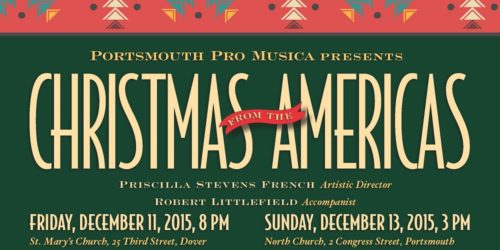Latest PPM News, Slider Image
Concert Program Notes – December 2015

WELCOME TO THE 31ST ANNUAL PORTSMOUTH PRO MUSICA CHRISTMAS CONCERT.
Purchase Tickets by clicking here!
The following are the program notes for our upcoming Christmas Concert!
There is a large body of folk carols composed for the Christmas season from all over the world; today’s program highlights some settings by several acclaimed American composers. We open with a melody of Gregorian chant O Come, O Come, Emmanuel whose text foretells the coming of the Messiah and saviour of ancient Israel. In this arrangement the women’s and men’s voices are deftly set in counterpoint to eachother coming together at the “Rejoice!” refrain.
New England composer William Billings is generally believed to be America’s first choral composer. Billings lived in Boston during the Revolutionary War. He was well-known for his many collections of psalm tunes, fuguing and hymn tunes – many of which were named for Colonial towns (for example, Kittery, Exeter, Hull, etc.). Shepherd’s Carol (Shiloh) is one of the few Christmas tunes found in the collection Suffolk Harmony (1786).
From colonial tunes we next perform a contemporary setting of traditional Appalachian songs. Appalachian Carols by Vermont composer Gwyneth Walker was commissioned in 1998 by “Desert Voices” in Tuscon, AZ and encompasses a variety of moods. In her own words Walker writes:
The four songs selected for Appalachian Carols either had their origins in the Appalchian Mountains, or were adopted and transformed by this region. Thus, they are considered part of the folk and spiritual tradition of the Appalachian musical heritage. These new arrangements for chorus and brass quintet aim to retain the melodic and harmonic simplicity of the original carols, while expanding upon the inherent character of each song.
Harmonies in Wondrous Love are purposely open and sparse, within a folk idiom. The arrangement starts out in a slow and solemn tempo but evolves into a lighter, joyous refrain.
Cherry Tree Carol with its many verses is a ballad. The origin of the melody is Kentucky, and the words are a composite of various sources.
The focus of the interpretation is the sense of fear and awe that Joseph and Mary felt upon realizing that their baby would be the Son of God.
In “Jesus, Jesus, Rest Your Head” Mary and Joseph are depicted singing to the Baby. It is scored for two soprano and tenor solo voices with an off-stage French horn appropriate for the pastoral nature of this carol. It, too, is a Kentucky folk carol.
Originally a spiritual, “Go Tell it on the Mountain” is composed here in a swing style and builds to a triumphant ending!
Complementing the early American sound in the first half of today’s program is the popular and beautiful medley of Spanish carols compiled and composed by Conrad Susa. Carols and Lullabies was commissioned by and dedicated to Philip Brunelle who premiered the work in 1992 at Plymouth Congregational Church, Minneapolis. In the late 1980s Brunelle had suggested to Susa that he might compose a companion piece to the widely performed Ceremony of Carols of Benjamin Britten. Having been shown a collection of traditional Spanish carols by a friend Gary Holt who had sung them as a boy in Arizona, Susa was inspired to reconfigure the carols with a Southwestern theme – all while maintaining an earthy simplicity and rich harmonies. Some are raucous and playful while others are deeply expressive and poignant – from ballads to lullabies. Guitar, marimba and harp help to provide the Spanish flavor and context. The carols are performed without pause with the opening music reprised at the end of the work (just as in Britten’s masterpiece).
-PSF

Comments (0)